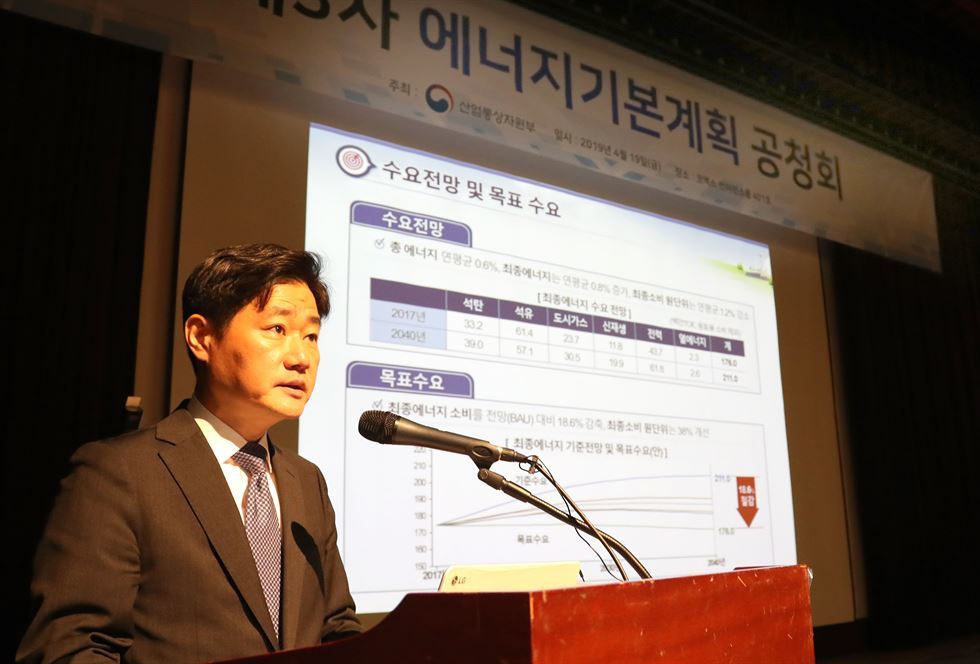Seoul to raise portion of renewable energy up to 35% by 2040

Park Jae-young, director of the Ministry of Trade, Industry and Energy, speaks during a public hearing on the government's energy revision plan at COEX in Seoul, Friday. Yonhap
SEOUL, Apr 19, 2019, The Korea Times. The government announced Friday that it will seek to boost the portion of renewable energy in the country’s power use to 35 percent by 2040, reported The Korea Times.
This is part of an energy-use revision plan unveiled by the Ministry of Trade, Industry and Energy to cut fine dust pollution and create a more sustainable economy
The plan is designed to reduce the nation’s reliance on “conventional” resources such as coal, and increase the use of those that are environmentally friendly to enhance safer and more sustainable growth.
The ministry is seeking to expand the share of renewable sources to around 30 to 35 percent of energy production by 2040, more than four times the current 7.6 percent.
Revisions to an overall energy-use plan are made every five years with the 20-year goal of shifting toward clean and safe sources to meet the demand for electricity and reduce fine dust air pollution. This is in line with President Moon Jae-in’s energy initiative.
“We will focus on reforming the structure of energy demand instead of expanding the supply,” Park Jae-young, a ministry official, said. “Our major goal is to create a high efficiency, low consumption energy market.”
The government also plans to reduce the portion of coal power and close down aged nuclear power plants while promoting the role of gas.
In 2018, coal accounted for 41.9 percent of Korea’s power generation portfolio, followed by nuclear energy with 23.4 percent and LNG with 26.8 percent.
In a panel discussion at a public hearing on the issue, experts offered differing opinions and exchanged their views on energy production and consumption.
Bae Jeong-hwan, a professor at the Department of Economics of Cheonnam National University, said the government should provide for several possible scenarios regarding energy demand.
“The government’s plan is based on the assumption that energy demand will peak around 2027 to 2028 and then decline with the shrinking population. However, we need to construct multiple scenarios to prepare for unexpected possibilities,” Bae said. “In addition, we need to nurture young talent and build infrastructure.”
“The government’s strict regulation is preventing natural gas and renewable energy from competing against coal energy,” Seok Kwang-hoon, an energy policy consultant of Green Korea, said. “The government should encourage the natural development of the gas market,”
Meanwhile, Park Ho-jeong, a professor at the Department of Food and Resource Economics of Korea University, commented that the government’s plan to expand the share of renewable power generation to around 30 to 35 percent by 2040 was likely to impose a burden on consumers.
Regarding the possible rise of electricity costs, Park said: “We plan to install an advanced metering infrastructure, a system that measures and analyzes energy use, to provide substantial information directly to consumers.”
Over the feasibility of the energy revision plan, the ministry official said, “It is a challenging issue, but the plan is an essential part of our long-term vision to prepare for the next generation.”
The industry ministry will finalize its revision in the coming months after collecting opinions and suggestions through more public hearings.
By Kwak Yeon-soo